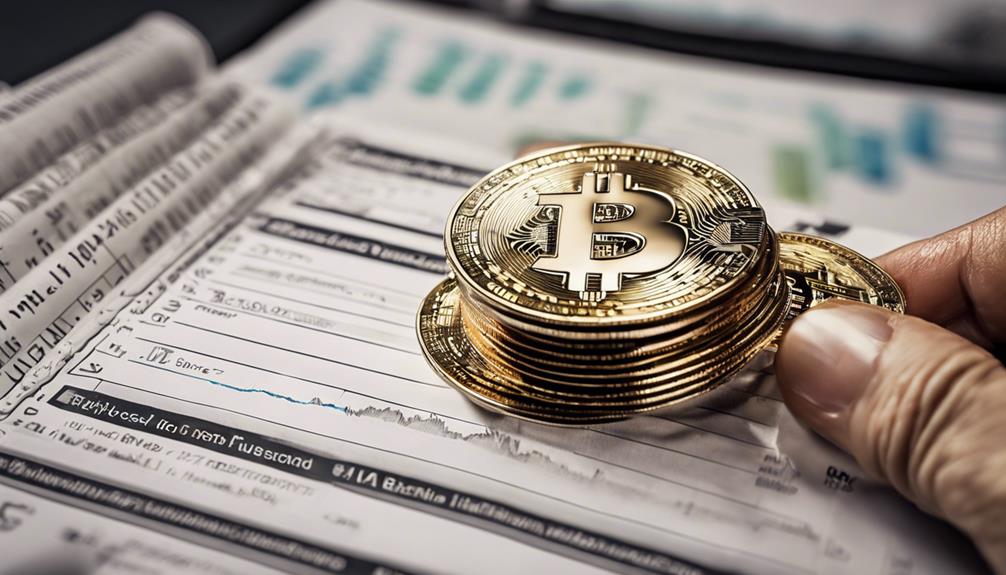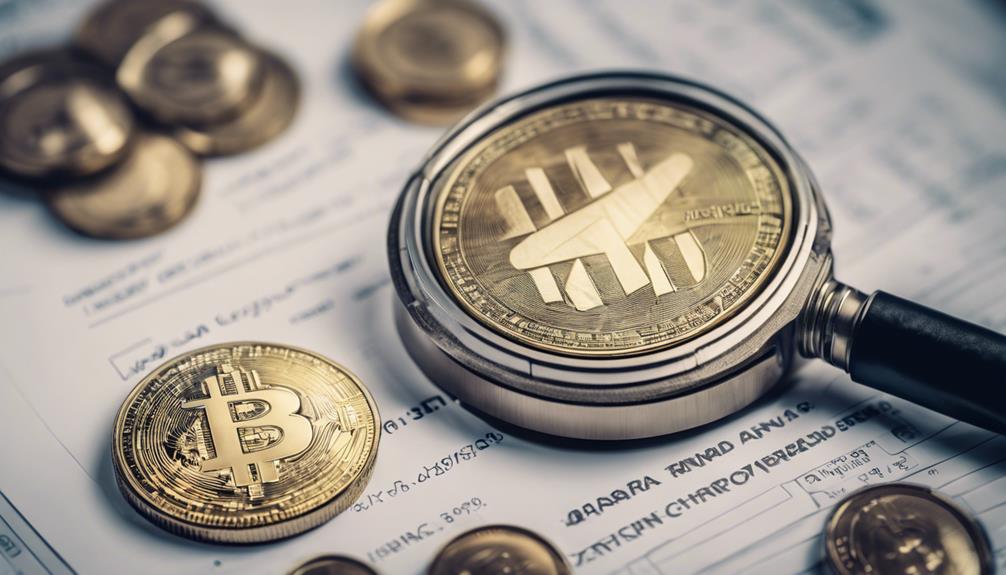Managing Bitcoin IRA investments requires following IRS regulations regarding cryptocurrencies as property since 2014. While direct contributions to Roth IRAs are not allowed, purchasing crypto within IRAs is permitted. Traditional IRA providers may not offer cryptocurrency options. It is important to adhere to securities laws, investment limits, and risk assessments. Custodians play a crucial role in protecting assets, following IRS guidelines, and preventing illegal activities. Diversification and risk management tactics help safeguard investments. Keeping accurate records is crucial for meeting reporting requirements. Reduce risks by diversifying your portfolio in a Bitcoin IRA and staying informed. Understanding and abiding by these regulations can enhance financial outcomes.
Key Takeaways
- IRS treats cryptocurrencies as property since 2014.
- Direct contributions of crypto to Roth IRA not permitted.
- Compliance with IRS regulations and securities laws crucial.
- Custodians safeguard assets and ensure AML compliance.
- Record-keeping, reporting, and diversification are essential for Bitcoin IRA investments.
IRS Regulations for Bitcoin IRAs
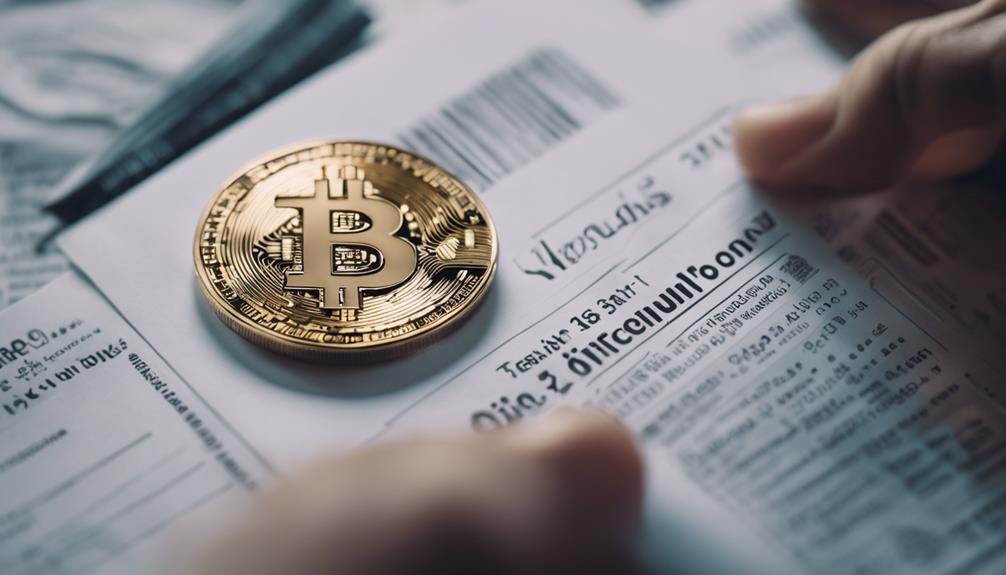
Exploring the world of Bitcoin IRAs requires a clear understanding of IRS regulations, which have treated cryptocurrencies as property since 2014. When it comes to IRA investments, the IRS has established specific rules regarding the inclusion of Bitcoin and other cryptocurrencies in retirement accounts. While direct contributions of crypto to a Roth IRA aren't permitted, purchasing them within the account is allowed. However, traditional IRA providers may not offer the option to add cryptocurrencies to their accounts.
The emergence of Crypto IRAs has provided an alternative for individuals looking to invest in digital assets within a tax-advantaged retirement account. By holding Bitcoin in an IRA, investors can potentially add diversification to their portfolio, although it's important to take into account the high volatility associated with cryptocurrencies. Understanding and adhering to IRS regulations concerning Bitcoin IRAs is vital to ensure compliance and maximize the benefits of including digital assets in your financial planning for retirement.
Custodial Responsibilities and Compliance
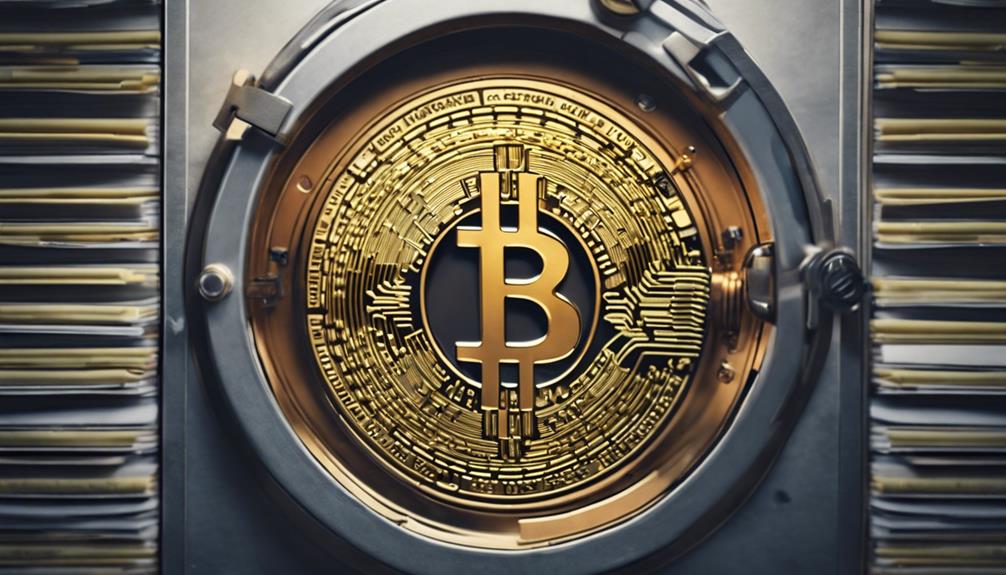
Custodians of Bitcoin IRAs hold the important responsibility of safeguarding cryptocurrency assets on behalf of the account holder. Compliance is essential in this role, with custodians required to adhere to IRS regulations, maintain meticulous record-keeping practices, and guarantee secure storage solutions for digital assets.
Upholding anti-money laundering (AML) and know your customer (KYC) regulations is also vital. These responsibilities include providing accurate account statements, reporting transactions in a timely manner, and following strict guidelines to prevent illicit activities.
Securities Laws for Bitcoin IRAs
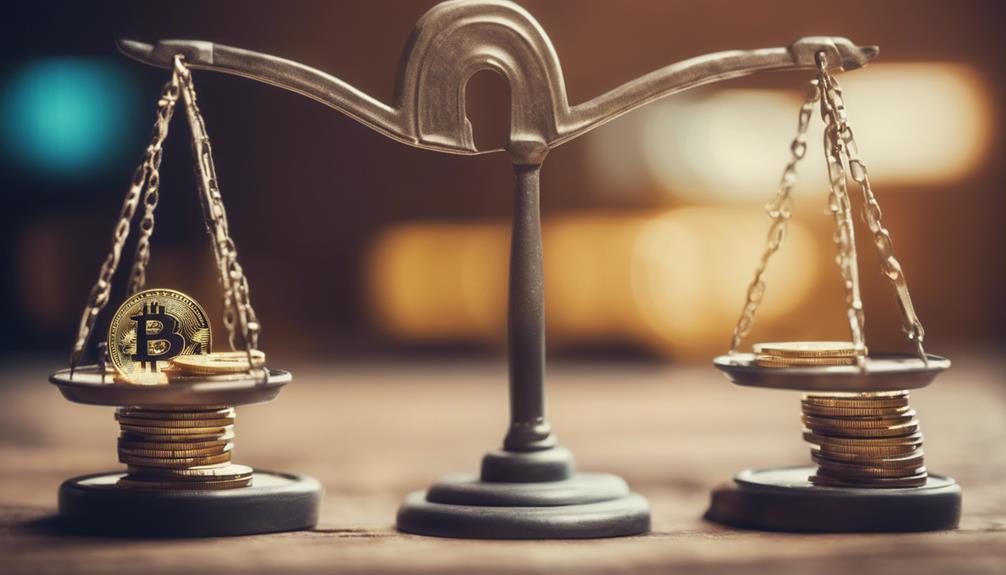
Securities laws for Bitcoin IRAs encompass regulatory compliance requirements, investment limitations, risks, and reporting obligations.
Adhering to these laws is essential for the legal and ethical operation of Bitcoin IRAs, ensuring investor protection and market integrity.
Providers must comply with registration, disclosure, and anti-fraud provisions to avoid severe penalties and legal repercussions.
Regulatory Compliance Requirements
Adhering to regulatory compliance requirements is essential for Bitcoin IRA providers to guarantee investor protection and prevent fraudulent practices in investment offerings. When it comes to regulatory requirements for Bitcoin IRAs, there are key aspects to take into account:
- Compliance with Securities Laws: Ensuring adherence to regulations governing the offering and selling of investment products.
- Investor Protection Standards: Upholding the necessary measures to safeguard investors within Bitcoin IRAs.
- Prevention of Fraud: Implementing practices to deter fraudulent activities and misrepresentation in investment products.
- Legal Boundaries: Operating within the framework of securities laws to protect both the providers and investors.
Investment Limitations and Risks
In order to guarantee compliance with securities laws and protect investors, Bitcoin IRAs must carefully evaluate investment limitations and associated risks. Securities laws set legal standards for the types of assets allowed in Bitcoin IRAs to secure investor protection.
These investment limitations aim to prevent risky or unsuitable assets from being included, safeguarding retirement savings. Compliance with securities laws is vital to maintain transparency and uphold investor protection within Bitcoin IRAs.
Understanding these legal standards is essential to avoid potential violations or legal issues related to investment choices. By adhering to securities laws and evaluating investments based on these limitations, Bitcoin IRAs can promote a secure and regulated environment for investors, reducing the likelihood of fraudulent or high-risk investments.
Reporting and Disclosure Obligations
To safeguard investors in Bitcoin IRAs, we guarantee compliance with reporting and disclosure obligations under securities laws.
- Ensuring accurate and timely information for Bitcoin IRA investors
- Preventing fraud, misrepresentation, and unethical practices
- Promoting transparency, accountability, and investor confidence
- Legal consequences and penalties for non-compliance with reporting and disclosure obligations
Asset Protection and Financial Standards

When considering Bitcoin IRAs, it's important to understand how asset protection and financial standards play a significant role in safeguarding investments.
Risk management strategies help mitigate potential financial vulnerabilities, while regulatory compliance requirements guarantee adherence to IRS regulations for tax-advantaged retirement accounts.
Diversification within Bitcoin IRAs offers stability by spreading investments across different asset classes, enhancing the overall protection of retirement savings.
Risk Management Strategies
Securing cryptocurrency holdings in a Bitcoin IRA involves employing asset protection strategies such as utilizing cold wallets for safe storage. To effectively manage risks associated with Bitcoin IRA investments, consider the following strategies:
- Diversify investments within the Bitcoin IRA to mitigate risk and protect against market volatility.
- Follow financial standards and conduct due diligence when selecting IRA custodians and exchanges.
- Implement multi-signature authentication and strong password practices to enhance security measures.
- Adhere to IRS guidelines and regulations for retirement accounts to guarantee compliance and safeguard the integrity of your Bitcoin IRA investment strategy.
Regulatory Compliance Requirements
Managing regulatory compliance requirements in Bitcoin IRAs involves prioritizing asset protection and meeting stringent financial standards. Ensuring compliance with regulatory standards is important for safeguarding investors' assets and upholding industry integrity. Asset protection regulations play an essential role in mitigating risks associated with cryptocurrency investments in IRAs, while meeting financial standards enhances the security and stability of investments. By adhering to these regulations, Bitcoin IRAs maintain credibility and reliability in the market. This bitcoin investment regulatory framework establishes clear guidelines that financial institutions and custodians must follow to ensure transparency and accountability. It not only builds trust among investors but also fosters a stable environment for cryptocurrency investments to thrive within retirement accounts. By operating within this framework, Bitcoin IRAs can effectively navigate the challenges of the evolving financial landscape while protecting investor interests.
| Category | Description |
|---|---|
| Regulatory Compliance | Adherence to asset protection and financial standards set by regulatory bodies. |
| Asset Protection | Mitigating risks associated with cryptocurrency investments in Bitcoin IRAs. |
| Financial Standards | Meeting stringent standards to maintain the security and stability of investments. |
Diversification for Stability
To enhance stability and protect against market volatility, diversification in a Bitcoin IRA involves spreading risk across various asset classes like cryptocurrencies, real estate, and precious metals.
- Tax Benefits: Diversifying a Bitcoin IRA can potentially lead to tax advantages, depending on the investments chosen and their performance.
- Financial Advisor: Seeking guidance from a financial advisor can help in creating a diversified portfolio tailored to individual risk tolerance and retirement goals.
- Self-Directed IRA Account: Investors can take control of their retirement savings by utilizing a self-directed IRA account to diversify beyond traditional assets.
- Cryptocurrency: Including cryptocurrencies in a diversified portfolio can offer exposure to a high-growth, volatile asset class while balancing risk with other stable investments.
Record-Keeping and Reporting Requirements

Effective record-keeping and accurate reporting are essential to the proper management of Bitcoin IRA investments. Bitcoin IRA investors must meticulously document all transactions, including purchases, sales, and transfers. Reporting requirements mandate the provision of precise details on gains, losses, and any distributions from the account. It is vital for investors to maintain records of the cost basis for each cryptocurrency transaction to guarantee the accurate reporting of capital gains or losses to the IRS. Compliance with these stringent record-keeping and reporting rules is paramount to guarantee the appropriate tax treatment of Bitcoin IRA investments. Failure to meet these obligations can result in penalties, audits, and potential tax liabilities for Bitcoin IRA holders.
| Record-Keeping and Reporting Requirements | |
|---|---|
| Key Points | Details |
| Transactions | Document all purchases, sales, and transfers. |
| Capital Gains | Report gains and losses accurately for each transaction. |
| Compliance | Adherence to rules ensures proper tax treatment. |
| Penalties | Failure to comply can lead to audits and tax liabilities. |
Mitigating Risks in Cryptocurrency Investments

When investing in cryptocurrency, we must prioritize mitigating risks to safeguard our Bitcoin IRA portfolio. Understanding the volatile and speculative nature of the cryptocurrency market is essential for risk management.
Here are some key strategies to mitigate risks effectively:
- Conduct thorough research on various crypto assets and stay informed about market trends to make informed investment decisions.
- Diversify your investment portfolio within your Bitcoin IRA to reduce exposure to specific risks associated with individual crypto assets.
- Implement risk management techniques like setting stop-loss orders and having a clear investment plan to protect against sudden market fluctuations.
- Seek guidance from a financial advisor or investment professional with expertise in cryptocurrency investments to develop a robust risk mitigation strategy tailored to your Bitcoin IRA investments.
Frequently Asked Questions
Can an IRA Invest in Bitcoin?
Yes, an IRA can invest in Bitcoin. While direct contribution of Bitcoin to a Roth IRA isn't allowed, purchasing Bitcoin is permitted through self-directed IRAs.
Traditional IRA providers may not support adding Bitcoin directly to the account. Bitcoin IRAs have emerged as a way to include cryptocurrencies in retirement investments, offering diversification but also exposing investors to the high volatility associated with cryptocurrencies.
Do You Pay Taxes on Bitcoin Ira?
Yes, taxes are applicable to Bitcoin IRAs. Gains are tax-deferred until withdrawal, then taxed as ordinary income.
Early withdrawals before age 59 ½ may incur a 10% penalty and income tax. Roth Bitcoin IRAs offer tax-free withdrawals in retirement, aiding long-term tax planning.
Understanding these tax implications is vital for optimizing retirement savings and minimizing tax burdens.
Is Bitcoin IRA Insured?
Bitcoin IRAs aren't insured by the FDIC or SIPC, exposing investors to market risks. Due to the volatile nature of cryptocurrencies, insurance coverage for Bitcoin IRAs is unavailable. This lack of protection means any losses from market fluctuations are the responsibility of the investor.
It's essential to understand the risks involved in Bitcoin IRAs and consider diversifying investments to mitigate potential losses.
Can I Withdraw Bitcoin From Bitcoin Ira?
Yes, we can withdraw Bitcoin from a Bitcoin IRA. The process involves submitting a request to the custodian for either cash or transferring to another qualified retirement account. Withdrawal requests may take time due to security measures.
It's important to consult with a financial advisor or tax professional to guarantee compliance with IRS regulations and minimize tax implications. Be aware of potential penalties and taxes if withdrawals aren't done in accordance with the rules.
Conclusion
To sum up, understanding the rules for Bitcoin IRA investments requires careful attention to IRS regulations, custodial responsibilities, securities laws, asset protection, record-keeping, and risk mitigation.
One interesting statistic to note is that as of 2021, over 100,000 Americans have invested in Bitcoin IRAs, with the total value of these accounts surpassing $2 billion.
It's essential to stay informed and compliant to protect your assets and maximize returns in the volatile world of cryptocurrency investments.

